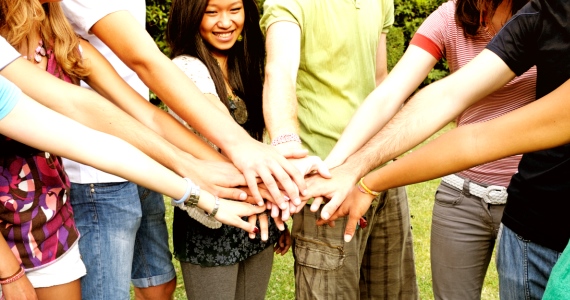The following is a script that can be used and modified for conducting a Jewish healing circle, followed by tips on how to run a successful healing circle. Learn more about how Sue Gurland started her Jewish healing circles at the following blog post.
I. Niggun—Ashrei
Ashrei
Ashrei yoshvei veitecha od y’halelucha.
אַשְׁרֵי יוֹשְׁבֵי בֵיתֶֽךָ, עוֹד יְהַלְלֽוּךָ
Happy are those who dwell in your House; they shall praise you forever. (Psalm 84:5)
II. Welcome to our Healing Circle. I’m ________and this is my co-facilitator and song leader, _________.
III. If this is the first time you’re joining us, we want you to feel comfortable and welcome; participate as much or as little as you want; you won’t be put on the spot, you can always pass.
- Our intention is to create healing community for ourselves and all those who need healing
- We ask you to keep confidentiality; speak with “I” statements; and remember that the most healing thing you can offer each other is not advice, but listening.
IV. Grounding
- Before we introduce ourselves, we start by grounding ourselves and our circle. It’s important to have a foundation for any spiritual work we do, and since we’re always connected to the Divine, we always need to be grounded.
- Invite to stand, ground like tree, bring light down over us. (This can be done as a seated visualization, meditation, or whatever leader feels comfortable with.)
V. Introduce ourselves—Please say your first name and how you’re feeling in your body right now. Take a moment to check in.
VI. I’d like to begin with a quote about healing from Rabbi Judy Shanks.
“In Jewish tradition, ‘healing’ is not always equal to ‘cure,’ so we offer these prayers in hope that the recipient will feel a sense of spiritual connection, that their pain might be lessened for a time, that they will be comforted by the strength of a supportive community surrounding them.
The energy derived from the combined voices and breathing of the group, the emotions that arise among participants being poured into the practice and the sacred history of all the generations who have uttered these words before, is all woven into the chants, [songs & prayers] promoting a very deep level of soul-healing.”
—from http://www.sacredhebrewchant.com/HealingCircles.html
VII. There are many prayers and writings in our tradition that deal with healing. Psalms are the traditional words of comfort that contain all the emotions. Let’s read Psalm 121 together.
VIII. Psalm 121 has been set to music in the familiar Esa Einai. ______will lead us in this song now.
| ESA EINAI | I WILL LIFT UP MY EYES |
| Esa einai el heharim, me’ayin me’ayin yavo ezri Esa einai el heharim, me’ayin me’ayin yavo ezri Ezri me’im Hashem, |
I will lift up my eyes to the mountains. From where does my help come? I will lift up my eyes to the mountains. From where does my help come? My help comes from the Lord, |
IX. But sometimes we don’t feel so connected to God. We don’t know what to say to God.
Here’s a paragraph from Rabbi Harold Kushner, author of When Bad Things Happen to Good People.
Would someone like to read?
“This is the kind of prayer that God answers. We can’t pray that He makes our lives free of problems; this won’t happen, and it is probably just as well. We can’t ask Him to make us and those we love immune to disease, because He can’t do that. We can’t ask Him to weave a magic spell around us so that bad things will only happen to other people, and never to us. People who pray for miracles usually don’t get miracles any more than children who pray for bicycles, good grades, or boyfriends get them as a result of praying. But people who pray for courage, for strength to bear the unbearable, for the grace to remember what they have left instead of what they have lost, very often find their prayers answered. They discover that they have more strength, more courage than they ever knew themselves to have. Where did they get it? I would like to think that their prayers helped them tap hidden reserves of faith and courage which were not available to them before. The widow who asks me on the day of her husband’s funeral “What do I have to live for now?”, yet in the course of the ensuing weeks finds reasons to wake up in the morning and look forward to the day; the man who has lost his job or closed his business and says to me, “Rabbi, I’m too old and tired to start all over again,” but starts over again nonetheless—where did they get the strength, the hope, the optimism that they did not have on the day they asked those questions? I would like to believe that they received those things from the context of a concerned community, people who made it clear to them that they cared, and from the knowledge that God is at the side of the afflicted and the downcast.”
—Rabbi Harold Kushner, With Healing on its Wings, p. 29, Masorti Publications
X. And sometimes we don’t know how to pray. Let’s read this poem by Rabbi Sheldon Zimmerman, “A Prayer for Prayer”:
O My God
My soul’s companion
My heart’s precious friend
I turn to You.
I need to close out the noise
To rise above the noise
The noise that interrupts—
The noise that separates—
The noise that isolates.
I need to hear You again.
In the silence of my innermost being,
In the fragments of my yearned-for wholeness,
I hear whispers of Your presence—
Echoes of the past when You were with me
When I felt Your nearness
When together we walked—
When You held me close, embraced me in Your love,
laughed with me in my joy.
I yearn to hear You again.
In Your oneness, I find healing.
In the promise of Your love, I am soothed.
In Your wholeness, I too can become whole again.
Please listen to my call—
help me find the words
help me find the strength within
help me shape my mouth, my voice, my heart
so that I can direct my spirit and find You in prayer
In words only my heart can speak
In songs only my soul can sing
Lifting my eyes and heart to You.
Adonai S’fatai Tiftach—open my lips, precious God,
so that I can speak with You again.
—From Healing of Soul, Healing of Body, Jewish Lights Publishing, p. 102
XI. Now let’s take a few moments to sit quietly and listen for what you might want to say to God.
XII. [Musician starts playing Ana El Na R’fa Na La quietly]
Let’s turn our attention now to those in need of healing. Close your eyes and bring your attention to your heart. Breathe in and out of your heart and visualize anyone you are praying for, for their healing. Imagine them whole and healed.
At this time, those who wish, can come up and light a candle and recite the names of those for whom they’re praying for healing in English or Hebrew. You can also include your own name. If you’d rather not light a candle, you can say the names into the circle from your seat. If you’d like to light a candle and say the names silently, that’s fine. We will hold you in our attention until everyone’s complete.
Please come up one at a time and, in the interest of the environment, just light one candle for all people for whom you’re praying.
We will now sing the oldest healing prayer that comes from Torah. It is Moses’ prayer for healing for his sister, Miriam.
ANA EL NA R’FA NA LA
אֵל נָא רְפָא נָא לָהּ
Ana El na r’fa na la
Please God, I ask, heal her now.
XIII. Now take a moment and breathe that healing energy into your own body. The energy that heals is that of love, and this song really brings it home. Let’s all stand together and sing Unending Love.
We Are Loved
We are loved, loved, loved
By unending love, an ending love
We are embraced by arms that find us
even when we are hidden from ourselves
We are touched by fingers that soothe us
even when we are too proud for soothing
We are counseled by voices that guide us
even when we are too embittered to hear
We are supported by hands that uplift us
even in the midst of a fall
We are urged on by eyes that meet us
even when we are too weak for meeting
Embraced, touched, soothed, and counseled
Ours are the arms, the fingers, the voices
Ours are the hands, the eyes, the smiles
We are loved by an unending love
—Rabbi Rami Shapiro
XIV. Now lift up your arms and bring that healing energy down over your body. Take a moment and feel the energy expanding out around the circle, connecting all of us in the Oneness. (This can be done seated without the movement, if preferred.) Speak one word into the circle that’s your wish for the world, for the healing of the planet.
We’ll end by singing Oseh Shalom—May the One who brings peace to the Universe bring peace to us and to all people, Amen.
OSEH SHALOM
Oseh shalom bim-ro-mav
Hu ya-ah-seh shalom aleynu
V’al kol Yisrael v’imru, v’imru: amen.
Ya-a-seh shalom, ya-a-seh shalom
Shalom aleynu v’al kol Yisrael
Ya-a-seh shalom, ya-a-seh shalom
Shalom aleynu v’al kol yoshvei teivel.
XV. Now let’s clap and send that energy back out into the Universe.
Here are some tips to create a successful healing circle:
- Choose a space that can be closed off to contain the group and promote intimacy. Choose a space in which you can dim the lights. Use a microphone if needed.
- Pick a specific time each month for the group, like the first Monday or every other Thursday so people can mark their calendars. A date that floats — like Rosh Chodesh — is too hard to plan for.
- Keep the program to one hour. It’s hard to keep focus for longer than that, especially with emotional content.
- Choose a theme for the month and build content around it.
- Integrate the music and text. Allow for sufficient planning time and coordination between facilitators.
- Be clear about your intention for the group and verbalize it.
- Create a safe space, ask for confidentiality, and allow people to pass if called on.
- If participants are sharing, build in ways to keep more vocal people from dominating the group.
- Make sure everyone’s OK before they leave. If necessary, sit with someone having a hard time after the group is over.
- Provide refreshments and time for conversation afterward.
- Keep a contact list of participants for those who want to be notified each month.
- If funding is an issue, ask for voluntary donations.
Sue Gurland runs Jewish healing circles in Boca Raton, and is the creator of Moving Through the Tree of Life. She holds a Master of Arts in Teaching degree from Yale University, a Master of Acupuncture degree from the Traditional Acupuncture Institute, and a Certificate of Completion in Jewish Spiritual Direction from the Lev Shomea Institute.













One Response
So glad to find this post as I look for “my Place” as a psalmist at our synagogue. I will ask my rabbi if I can lead a monthly healing circle!